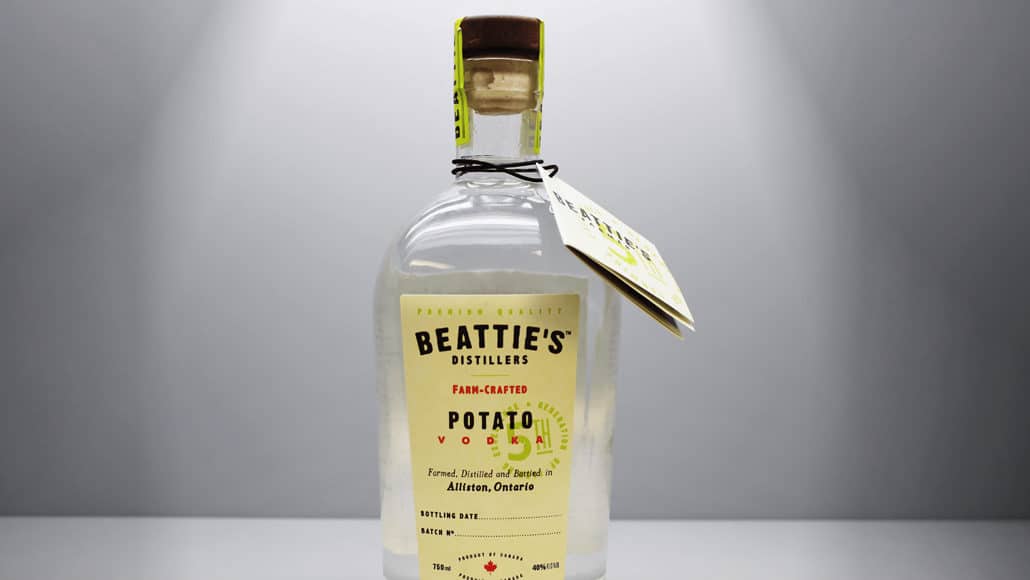[deck]Ontario grower Ken Beattie is turning potatoes into vodka as part of his new business venture — but he faces some stiff competition in a crowded market.[/deck]
When Ontario potato grower Ken Beattie visited a vodka distillery in Prince Edward Island several years ago, he was inspired to try creating his own brand of high-quality spirits using his own potatoes.
Now, Beattie’s Farm-Crafted Potato Vodka is ready to launch with a small-batch trial run in select Ontario stores this spring, and an entire distillery is being constructed on the producer’s 4,000-acre potato farm near Alliston.
“Ken has a firm commitment to ‘doing things right’, and he wants to make something of quality. Potatoes make smoother vodka,” says Andy Murison, head of marketing for Beattie’s Farm-Crafted Potato Vodka.
Murison has 20 years of experience in the adult beverage industry, having worked for key players like spirits giant Diageo, which owns brands such as Smirnoff, Johnny Walker and Captain Morgan.
“If you go way back to the 15th and 16th centuries when the Polish and Russians were making vodka, they began with potatoes,” says Murison. “Modern vodka is made from all kinds of crops — grain, grapes, you name it — but in Ken’s view, potatoes make the purest form of vodka. That’s why he’s taking this approach.”

$2 Billion-A-Year Industry
The Canadian vodka market, Murison admits, is a crowded one. Vodka is a $2 billion-a-year industry in this country, with five million cases sold (which represents nearly 30 per cent of all distilled spirits sold in Canada every year).
According to the recent Agriculture and Agri-Food Canada report Consumer Trends — Wine, Beer and Spirits in Canada, vodka is the No. 1 spirit here, surpassing Canadian whisky for the first time in 2006. It’s been the king ever since.
According to AAFC’s report The Canadian Distillery Industry, “This indicates a shift in consumer taste as young Canadians are choosing cocktails more frequently. Vodka provides the most neutral base for mixed drinks and is particularly good to mix with the new flavoured liqueurs on the market.”
There’s a movement toward local craft products in the market. People want products that have a more local relevance to them, and we feel we can take advantage of that consumer trend.
– Andy Murison
But according to AAFC, the competition is fierce — between 2008 and 2012, there were 28 vodka launches in Canada. In that time frame, there were a grand total of 405 new alcoholic beverage products introduced to the Canadian market.
“Small-scale food and beverage companies, including craft distillers, face challenges in accessing capital, competing with well-known brands, and meeting regulatory requirements,” says Monica Treidlinger, distilled spirits sector specialist for Agriculture and Agri-Food Canada’s market and industry services branch.
The alcoholic beverage industry is highly regulated, with distribution limited through liquor authorities in each province. Companies which do not have an established brand, extensive sales experience, or consistent production volumes may find it difficult to meet the thresholds required by liquor authorities in order to access limited shelf space, he notes.
Murison notes that despite the number of brands all vying for market share, there’s room for a made-in-Ontario potato vodka on the shelf. There are only two other potato vodkas made in Canada, he says, with one being distilled by the Prince Edward Distillery and the other from British Columbia.

Creating a Brand
The fact that potatoes make such excellent vodka, Murison says, is one factor that will help Beattie’s Farm-Distilled Potato Vodka stand out in the crowd. The russet and Dakota Pearl potato varieties it’s made from contain high levels of starch, which is converted to the sugar that’s needed to make alcohol.
Beattie’s farm also enjoys access to high-quality on-site water, which Murison says is another factor that will help distinguish the product. Consumer trends will also play a role in making the product successful, he adds.
“There’s a movement toward local craft products in the market. We’ve seen this in Europe and Canada in the last 10-15 years. People want products that have a more local relevance to them, and we feel we can take advantage of that consumer trend,” Murison says.
Treidlinger can testify to that, adding that, “Craft distillers can make small-batch, specialized products for consumers. They can take advantage of niche opportunities to meet the needs of local consumers.”
Although regulations don’t allow on-premise sales of distilled spirits similar to those enjoyed by local wineries or breweries, craft distillers can work with local government and event organizers to promote their products through agri-tourism and other local events to bring consumers to their distillery, Treidlinger notes.
“With the support of a loyal following, craft distillers can build a brand,” she says. “However, they still need to focus on quality and service to succeed in the market.”
Murison says quality plays a big role in Beattie’s vision for his new vodka. “His commitment to the quality of the product will help this vodka stand out among the competition.”
Then there’s Ken Beattie’s personal story itself, something Murison says the brand hopes to benefit from. A fourth-generation potato grower, Beattie has played a pivotal role in Alliston, a community of just over 15,000 located about 100 kilometres north of Toronto in the heart of Ontario’s potato belt.
“Ken was a volunteer firefighter. He’s helped the community build a church. His family has donated 200 acres of farmland back to the province for the public to enjoy as a nature preserve,” Murison says.
Furthermore, Beattie will donate 50 cents from each bottle of vodka sold to a local hospice, which is funded through goodwill donations.
Discussions are already underway with Ontario’s liquor commission to get Beattie’s Farm-Crafted Potato Vodka into more than 300 of the province’s provincially run liquor stories, in addition to taverns and restaurants. There are plans to take it outside Ontario and into Manitoba, New Brunswick and beyond. Ultimately, Murison says it’s hoped the vodka will eventually be available in the United States.











